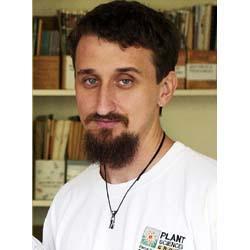Caravan Park awarded for using CQU research product
Published on 15 December, 2004
Emerald's Gem Air Village Caravan Park has been named as one of two winners of the Caravan Industry Australia 2004 Industry Innovation Award, thanks to its installation of the Kele Effluent and Wastewater Treatment System (KEWT).
KEWT is a unique system for the treatment of wastewater and effluent which is now be marketed by GBG Project Management ( www.gbgprojects.com ).
The innovation flowed out of research by CQU postgraduate student Ben Kele.
The caravan park is located at the Willows sapphire fossicking area about 70 km west of Emerald. The system constructed at this park is unique.
 Mr Kele said the treated effluent is being used in the sapphire mining process to wash the dirt/overburden and also to irrigate the park.
Mr Kele said the treated effluent is being used in the sapphire mining process to wash the dirt/overburden and also to irrigate the park.
"This has meant that the park can supply fossicking water to the tourists staying in the park even though the area has been drought declared and other tourist ventures in the area have had to buy water in to keep their tourist trade," he said.
"Stones over a 100 carats have been found using the recycled water.
"During peak season the park produces about 26 000 L of wastewater per day, 18 000 L of which is transpired by the plants in the KEWT channels and 8000 L is available for reuse.".
KEWT uses a mixture of biological treatment systems and reuses effluent through a self-contained recirculatory form of sub-surface irrigation.
The concept is derived around a system of underground filter beds, connected by pipes within concrete pots that supply water and nutrients to vegetations grown over the channels.
The filter beds are planted with a series of native plants, tropical fruit trees and bamboos, which further treat the effluent through rhizofiltration. The plants use the treated effluent as a source of water and the nutrients inherent in the effluent as fertiliser.
With additional treatment stages the system can be used for aboveground reuse purposes, such as toilet flushing and firefighting.
The system has been tested at a number of sites throughout Queensland over the past five years and has proven extremely successful.
The system can be used for domestic purposes, however it is extremely beneficial environmentally and economically where the site is being used for 30 or more people.
KEWT can be retrofitted to existing structures or designed specifically for new infrastructures and there is minimal maintenance needed, compared to alternative systems.
With the help and support of the staff at CQU’s Plant Sciences Research Group, Mr Kele has been able to adapt known treatment systems and develop and refine contained reuse systems that are completely environmentally friendly.
The system is quickly gaining the recognition it deserves from councils, governments, environmental groups and the water industry.
Mr Kele has 15 years’ practical experience in the manufacture of onsite wastewater systems and five years’ experience in the study and installation of biological treatment and reuse systems.
“The system is unique because it combines different types of biofilters within a recirculating evapotranspiration bed. This allows the system to have a relatively high level of treatment combined with a robust resistance to large surges of wastewater,” he said.
“Many of the existing technologies fail to consistently meet the performance guidelines for public and environmental health. The inspiration behind the system was to design a technology that meets the performance guidelines under most operating conditions.
“The future of the system lies in the commercial/industrial or cluster residential. The system is most economic when used at sites larger than the average domestic household. Tourist developments; especially ecotourism, clusters of residential houses, island developments, etc are all potential applications for the technology.”.
Mr Kele said future research will focus on new substrate combinations for the biofilters, improved channel design, and plant selection.
For details call Ben Kele on 4923 2023 or 0407 268 069 or via b.kele@cqu.edu.au

